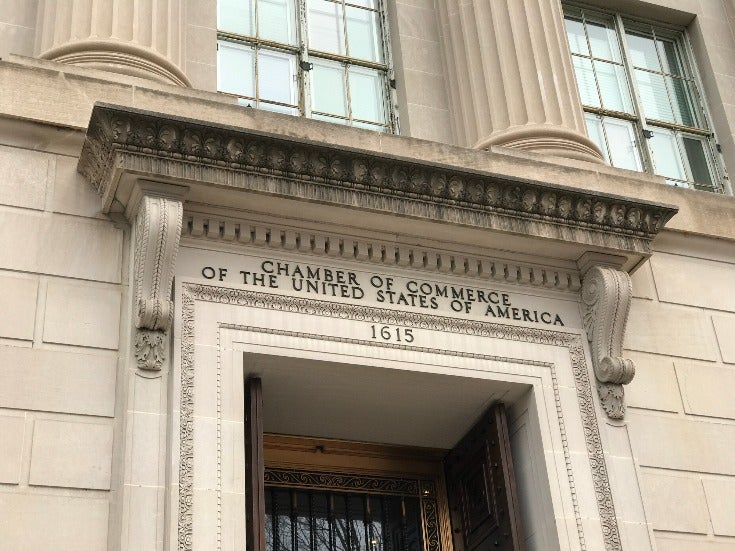The Chamber of Commerce on Friday pledged to fight rule changes put in place by the Federal Trade Commission (FTC) and its new chair Lina Khan Lina KhanHillicon Valley — Presented by Ericsson — DOJ unveils new election hacking charges FTC delays vote on supply chain study On The Money — Biden puts oil industry on notice MORE.
Lina KhanHillicon Valley — Presented by Ericsson — DOJ unveils new election hacking charges FTC delays vote on supply chain study On The Money — Biden puts oil industry on notice MORE.
“The FTC is waging a war against American businesses, so the U.S. Chamber is fighting back to protect free enterprise, American competitiveness, and economic growth,” Suzanne Clark, the group’s president and CEO said in a statement.
The powerful lobbying group pledged to “use every tool at our disposal, including litigation,” to oppose the agency’s agenda.
To kick off that opposition, the chamber filed a series of public records requests seeking information on a series of rule changes the FTC has adopted since Khan was appointed chair.
Khan has made several procedural changes since taking over aimed at speeding up action.
The chamber specifically called out the use of “zombie votes” cast by Rohit Chopra Rohit ChopraFTC delays vote on supply chain study On The Money — Will the billionaire tax survive Joe Manchin? Hillicon Valley — Blinken unveils new cyber bureau at State MORE before he left the commission to head the Consumer Financial Protection Bureau to advance certain issues through the now 2-2 deadlocked FTC.
Rohit ChopraFTC delays vote on supply chain study On The Money — Will the billionaire tax survive Joe Manchin? Hillicon Valley — Blinken unveils new cyber bureau at State MORE before he left the commission to head the Consumer Financial Protection Bureau to advance certain issues through the now 2-2 deadlocked FTC.
The corporate lobbying group also criticized the agency’s use of its civil penalty authority to warn whole industries about potentially illegal conduct.
A spokesperson for the FTC did not immediately return a request for comment on the chamber’s recent actions.
Commission spokesperson Lindsay Kryzak told The Wall Street Journal that the agency is “not going to back down because corporate lobbyists are making threats.”
While the chamber couched its criticism as coming from American business broadly, several organizations representing smaller businesses came to the FTC’s defense Friday.
“The positions that the Chamber takes on policies tend to be something that they would characterize as good for business, but really, in reality [are] good for large corporations,” said Sarah Crozier, communications director at the Main Street Alliance, a coalition of more than 30,000 small- to medium-sized businesses.
“We just want to continue to call out the fact that small businesses are not very well represented by the U.S. Chamber and here’s one more example of that,” she added.
Criticism of the FTC’s direction under Khan has also come internally from the two Republican commissioners on the panel.
GOP Commissioner Christine Wilson has criticized the new leadership repeatedly for decisions that she argues have sidelined the public and her staff.
Nidhi Hegde, director of strategy and programs at the progressive American Economic Liberties Project, pointed to the agency’s adoption of open meetings as a counter to that argument.
“For the first time it’s becoming more democratic where anyone, whether you’re a small business owner or you’re a consumer, you’re a worker, you can have the mic to tell your story,” she said. “Usually the corporations who are very well resourced and have lobbyists … are the only ones that are heard, and that has fundamentally changed and I think is shaking things up.”
